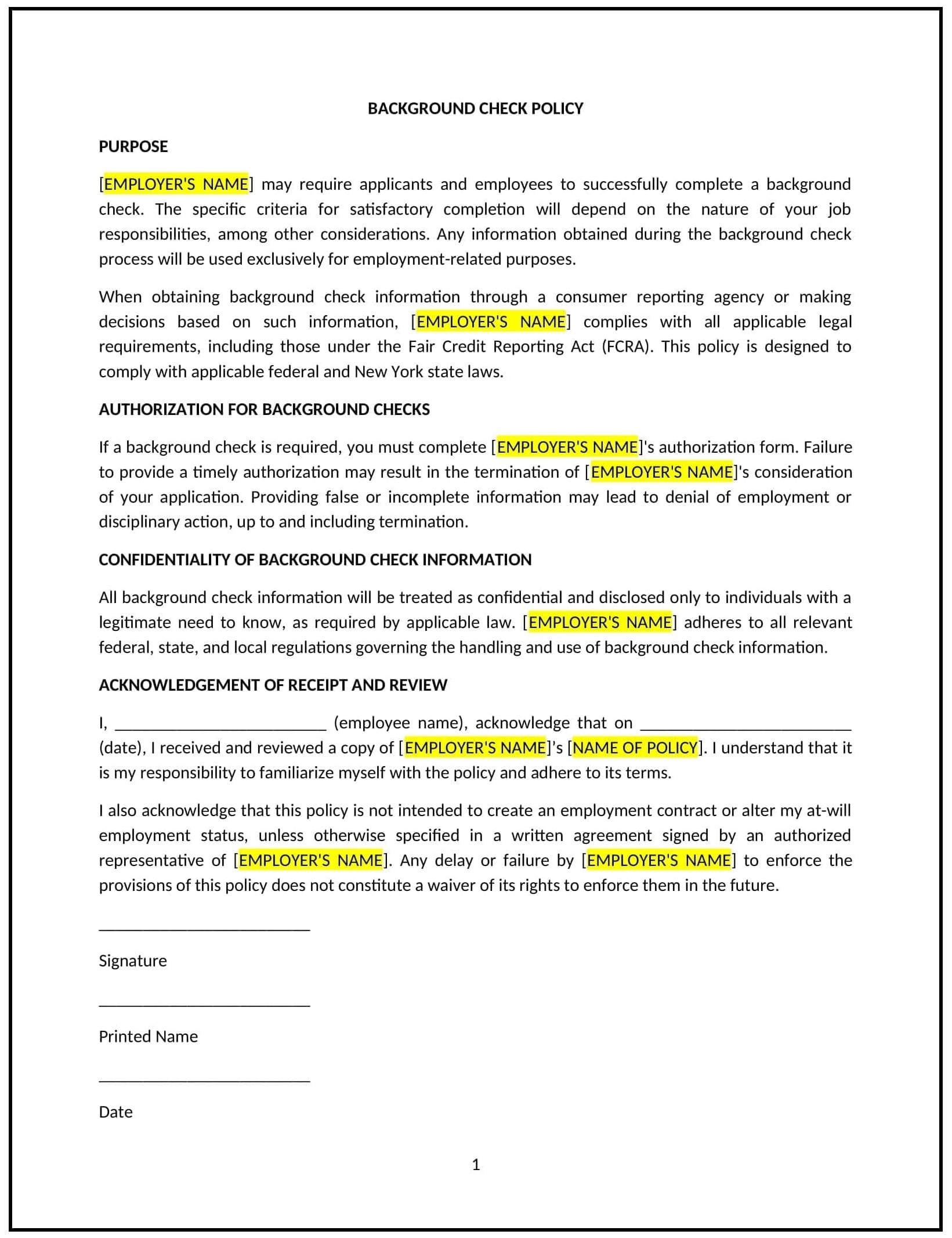Got contracts to review? While you're here for policies, let Cobrief make contract review effortless—start your free review now.

Customize this template for free
Background check policy (New York)
A background check policy helps New York businesses assess the suitability of prospective and current employees by verifying their background information, including criminal history, employment history, education, and other relevant details. This policy outlines the process for conducting background checks, the types of information to be checked, and how the results will be used to make informed hiring decisions. The policy also ensures compliance with New York state and federal laws regarding background checks, including Fair Credit Reporting Act (FCRA) requirements and anti-discrimination laws.
By implementing this policy, businesses can ensure a safe and trustworthy workforce, mitigate hiring risks, and comply with legal requirements while protecting the privacy and rights of candidates and employees.
How to use this background check policy (New York)
- Define the scope of background checks: Clearly outline the types of background checks that will be conducted, including criminal history, credit reports, education verification, employment history, and professional license checks. The policy should specify which types of checks are applicable to different roles within the company.
- Obtain consent from candidates: Ensure that all candidates give written consent before a background check is conducted. The policy should specify how consent will be obtained and how it will be documented in compliance with New York state and federal laws.
- Adhere to legal requirements: Comply with New York state laws, including those governing the use of criminal background information in hiring decisions, and ensure that background checks are conducted in accordance with the Fair Credit Reporting Act (FCRA). The policy should also outline how businesses will handle information regarding arrests, convictions, or other relevant findings.
- Use background check results appropriately: Outline how the results of background checks will be used to make hiring decisions. The policy should specify that background check results will be considered in relation to the job requirements and qualifications, and not used to make discriminatory decisions.
- Protect candidate privacy: Ensure that background check information is kept confidential and only shared with individuals who need to know in order to make employment decisions. The policy should specify how background check data will be stored, accessed, and disposed of securely.
- Provide an adverse action process: Include a process for informing candidates of any adverse employment decisions based on background check results. This includes providing candidates with a copy of the report and an opportunity to dispute any inaccuracies before a final decision is made.
- Review background check providers: Ensure that background check providers used by the business are compliant with all relevant laws and regulations. The policy should outline the process for selecting and reviewing background check vendors to ensure they follow fair practices and provide accurate information.
Benefits of using this background check policy (New York)
This policy offers several benefits for New York businesses:
- Reduces hiring risks: By conducting thorough background checks, businesses can reduce the risk of hiring individuals who may pose a safety threat, have a history of dishonesty, or lack the qualifications they claim to have.
- Ensures legal compliance: The policy helps ensure compliance with New York state laws, the Fair Credit Reporting Act (FCRA), and other federal regulations regarding background checks. This reduces the risk of legal challenges related to improper background check practices.
- Enhances workplace safety: By screening for criminal history, businesses can make more informed decisions about who is hired, helping to maintain a safe and secure workplace for all employees.
- Protects business reputation: The policy helps businesses make responsible hiring decisions, which can enhance its reputation as an ethical employer. It shows that the business takes the integrity of its workforce seriously.
- Promotes fairness and transparency: The policy ensures that all candidates are treated fairly and consistently during the hiring process, which promotes transparency and reduces the risk of discrimination claims. It also ensures that the background check process is explained clearly to candidates.
Tips for using this background check policy (New York)
- Communicate the policy clearly: Ensure that all candidates and employees understand the background check policy, including the types of checks that may be conducted and how their information will be used. This can be done during the hiring process and through employee handbooks or onboarding materials.
- Obtain consent from all candidates: Ensure that written consent is obtained from all candidates before conducting a background check. The policy should include a clear process for obtaining and documenting consent in compliance with New York laws.
- Review the results carefully: When reviewing background check results, ensure that the findings are considered in the context of the job for which the candidate is applying. The policy should emphasize the importance of using background checks as one factor in the overall hiring decision.
- Handle adverse actions responsibly: If a background check results in an adverse action, such as not hiring a candidate, provide the candidate with a copy of the report and allow them an opportunity to dispute any inaccuracies. The policy should ensure that candidates are informed and treated fairly.
- Protect sensitive information: Ensure that background check data is stored securely and only shared with individuals who have a legitimate need to know. The policy should include guidelines on how to protect this sensitive information and dispose of it properly when no longer needed.
- Periodically review the policy: Regularly review the background check policy to ensure that it remains compliant with any changes in New York state laws, federal regulations, and best practices. This helps businesses stay up-to-date and avoid potential legal pitfalls.